新版冀教版英语七年级下单元复习unit-1
- 格式:doc
- 大小:52.00 KB
- 文档页数:5
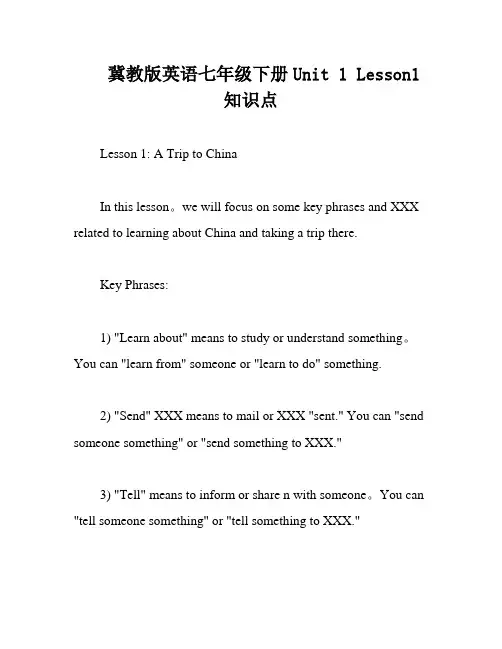
冀教版英语七年级下册Unit 1 Lesson1知识点Lesson 1: A Trip to ChinaIn this lesson。
we will focus on some key phrases and XXX related to learning about China and taking a trip there.Key Phrases:1) "Learn about" means to study or understand something。
You can "learn from" someone or "learn to do" something.2) "Send" XXX means to mail or XXX "sent." You can "send someone something" or "send something to XXX."3) "Tell" means to inform or share n with someone。
You can "tell someone something" or "tell something to XXX."4) "Think about" means to consider or have an n about something.5) "What does [someone] think about [something]?" is a n you can use to ask for XXX.6) "Note" XXX or a piece of paper used for writing down n。
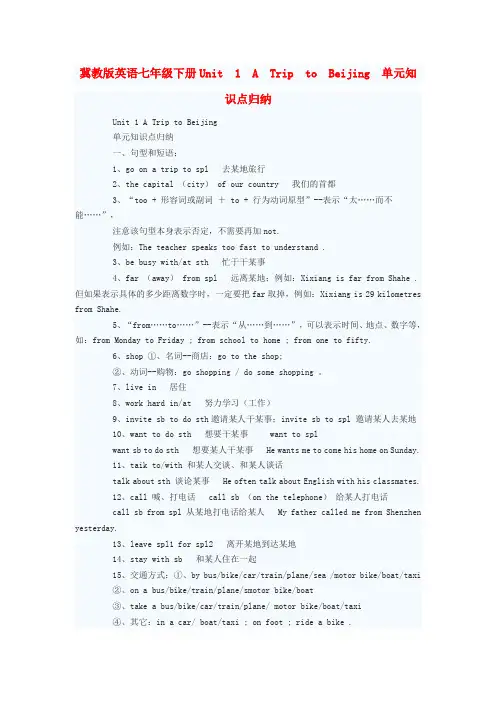
冀教版英语七年级下册Unit 1 A Trip to Beijing 单元知识点归纳Unit 1 A Trip to Beijing单元知识点归纳一、句型和短语:1、go on a trip to spl 去某地旅行2、the capital (city) of our country 我们的首都3、“too + 形容词或副词+ to + 行为动词原型”--表示“太……而不能……”,注意该句型本身表示否定,不需要再加not.例如:The teacher speaks too fast to understand .3、be busy with/at sth 忙于干某事4、far (away) from spl 远离某地;例如:Xixiang is far from Shahe .但如果表示具体的多少距离数字时,一定要把far取掉,例如:Xixiang is 29 kilometres from Shahe.5、“from……to……”--表示“从……到……”,可以表示时间、地点、数字等,如:from Monday to Friday ; from school to home ; from one to fifty.6、shop ①、名词--商店:go to the shop;②、动词--购物:go shopping / do some shopping 。
7、live in 居住8、work hard in/at 努力学习(工作)9、invite sb to do sth邀请某人干某事;invite sb to spl 邀请某人去某地10、want to do sth 想要干某事 want to splwant sb to do sth 想要某人干某事 He wants me to come his home on Sunday.11、taik to/with 和某人交谈、和某人谈话talk about sth 谈论某事 He often talk about English with his classmates.12、call 喊、打电话 call sb (on the telephone)给某人打电话call sb from spl 从某地打电话给某人 My father called me from Shenzhen yesterday.13、leave spl1 for spl2 离开某地到达某地14、stay with sb 和某人住在一起15、交通方式:①、by bus/bike/car/train/plane/sea /motor bike/boat/taxi②、on a bus/bike/train/plane/smotor bike/boat③、take a bus/bike/car/train/plane/ motor bike/boat/taxi④、其它:in a car/ boat/taxi ; on foot ; ride a bike .16、plan 名词--计划: make a plan for sth 为某事制定计划;动词--计划:plan (for) sth为某事做计划;plan to do sth 计划干某事。
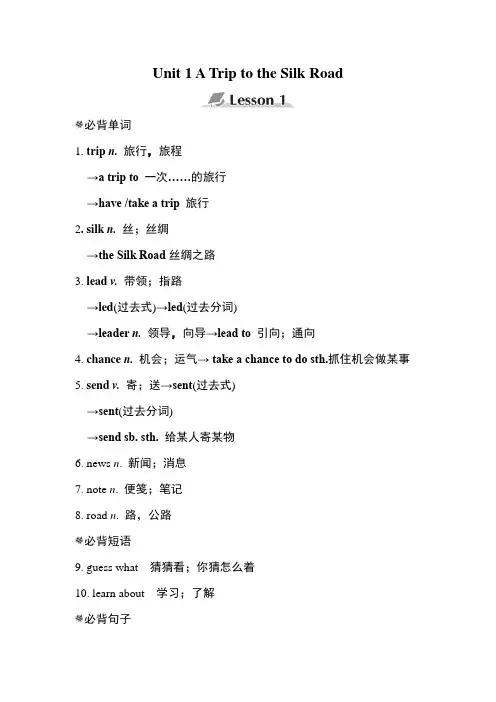
Unit 1 A Trip to the Silk Road必背单词1. trip n.旅行,旅程→a trip to 一次……的旅行→have /take a trip 旅行2. silk n.丝;丝绸→the Silk Road丝绸之路3. lead v. 带领;指路→led(过去式)→led(过去分词)→leader n. 领导,向导→lead to 引向;通向4. chance n.机会;运气→ take a chance to do sth.抓住机会做某事5. send v.寄;送→sent(过去式)→sent(过去分词)→send sb. sth. 给某人寄某物6. news n. 新闻;消息7. note n. 便笺;笔记8. road n. 路,公路必背短语9. guess what 猜猜看;你猜怎么着10. learn about 学习;了解必背句子11. We're learning about the Silk Road this month in school.在学校我们这个月学习丝绸之路。
12. May I go with them?我可以和他们一起去吗?13. Who will lead the trip?谁将带领这次旅行?必背单词1. exciting adj.使人激动的(用来修饰物)→excited adj.感到兴奋的(用来修饰人)2. along prep.沿着……→walk along 沿着……走3. arrive v.到达,抵达→arrive in 到达(大地点)→arrive at 到达(小地点)4. leave v.动身;出发;离开→left(过去式)→left(过去分词)→leave for sp. 前往某地;动身去某地5. kilometer n. 千米;公里6. special adj.特殊的;特别的必背短语7. plan for the trip 关于旅行的计划8. come back to 回……必背句子9. How exciting!多么令人激动!10. How far is it from Beijing to Xi'an?从北京到西安多远?11. But we don't have enough time to see it all.但是我们没有足够时间去看它的全貌。
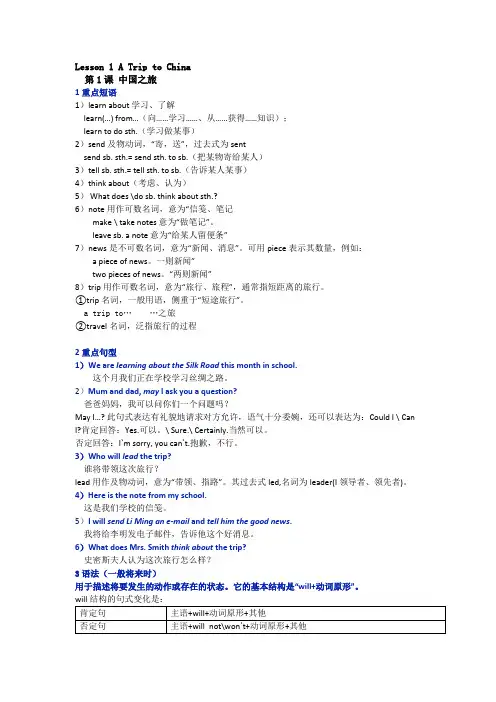
Lesson 1 A Trip to China第1课中国之旅1重点短语1)learn about 学习、了解learn(…) from…(向……学习……、从……获得……知识);learn to do sth.(学习做某事)2)send及物动词,“寄,送”,过去式为sentsend sb. sth.= send sth. to sb.(把某物寄给某人)3)tell sb. sth.= tell sth. to sb.(告诉某人某事)4)think about(考虑、认为)5) What does \do sb. think about sth.?6)note用作可数名词,意为“信笺、笔记make \ take notes 意为“做笔记”。
leave sb. a note 意为“给某人留便条”7)news是不可数名词,意为“新闻、消息”。
可用piece表示其数量,例如:a piece of news。
一则新闻”two pieces of news。
“两则新闻”8)trip用作可数名词,意为“旅行、旅程”,通常指短距离的旅行。
①trip名词,一般用语,侧重于“短途旅行”。
a trip to… …之旅②travel名词,泛指旅行的过程2重点句型1)We are learning about the Silk Road this month in school.这个月我们正在学校学习丝绸之路。
2)Mum and dad, may I ask you a question?爸爸妈妈,我可以问你们一个问题吗?May I…?此句式表达有礼貌地请求对方允许,语气十分委婉,还可以表达为:Could I \ Can I?肯定回答:Yes.可以。
\ Sure.\ Certainly.当然可以。
否定回答:I`m sorry, you can`t.抱歉,不行。
3)Who will lead the trip?谁将带领这次旅行?lead用作及物动词,意为“带领、指路”。
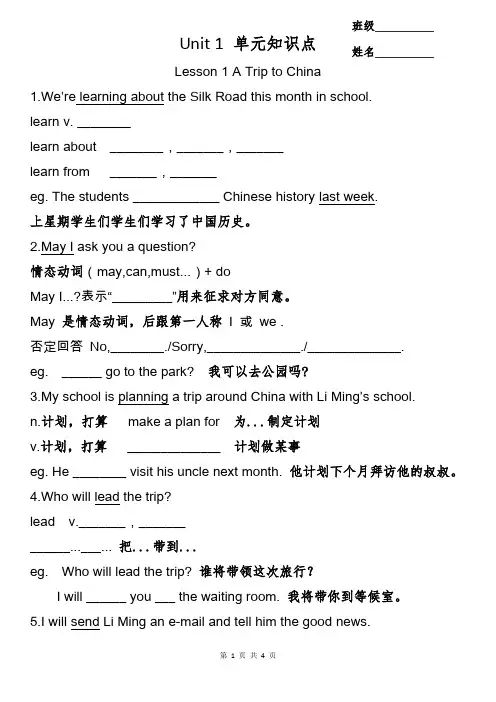
Unit 1 单元知识点Lesson 1 A Trip to China 1.We ’re learning about the Silk Road this month in school.learn v. ________learn about ________,_______,_______learn from _______,_______ eg. The students _____________ Chinese history last week.上星期学生们学生们学习了中国历史。
2.May I ask you a question?情态动词(may,can,must...)+ doMay I...?表示“_________”用来征求对方同意。
May 是情态动词,后跟第一人称 I 或 we .否定回答 No,________./Sorry,______________./______________.eg. ______ go to the park? 我可以去公园吗?3.My school is planning a trip around China with Li Ming’s school.n.计划,打算 make a plan for 为...制定计划v.计划,打算 ______________ 计划做某事eg. He ________ visit his uncle next month. 他计划下个月拜访他的叔叔。
4.Who will lead the trip?lead v._______,_____________...___... 把...带到...eg. Who will lead the trip? 谁将带领这次旅行?I will ______ you ___ the waiting room. 我将带你到等候室。
5.I will send Li Ming an e-mail and tell him the good news.班级__________姓名__________①send v. ______,______send sb.sth. = send ____ ____ ____ 给某人送某物eg.I want to send my mother a letter.= I want to send a letter to my mother.②news n.新闻,消息______名词I have some good news. 一则新闻_________ news两则新闻_________ news6.Is the Silk Road made of silk?由...制成be made ______(看出原材料-物理变化)be made ______ (看不出原材料-化学变化)eg. Books are made ___ paper. 书由纸制成。
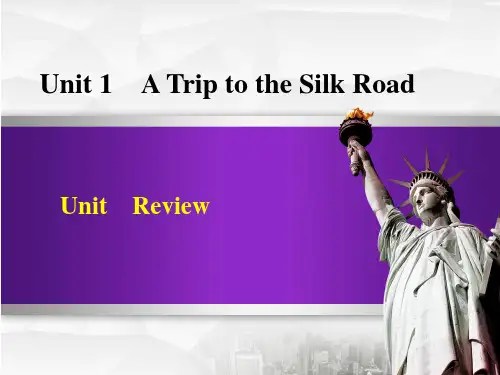
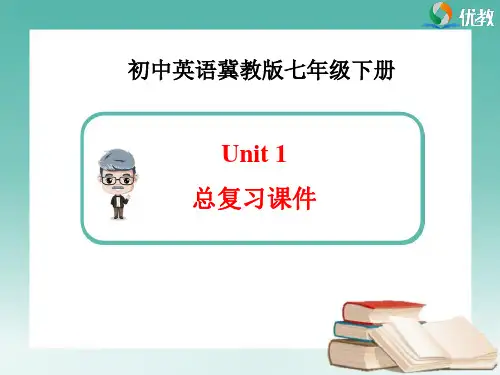

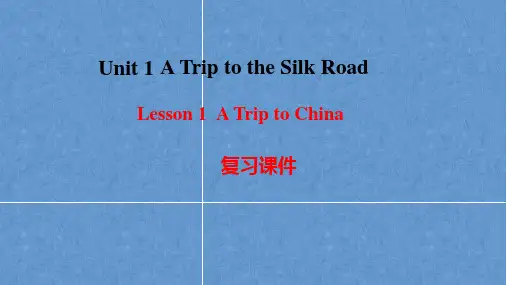
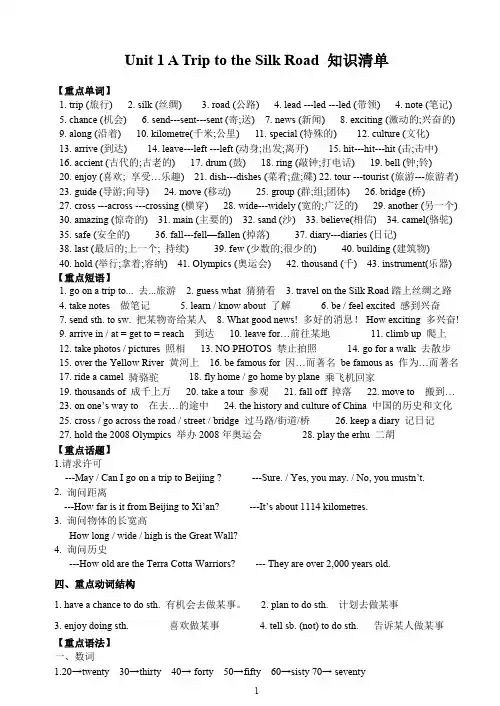
Unit 1 A Trip to the Silk Road 知识清单【重点单词】1. trip (旅行)2. silk (丝绸)3. road (公路)4. lead ---led ---led (带领) 4. note (笔记)5. chance (机会)6. send---sent---sent (寄;送)7. news (新闻)8. exciting (激动的;兴奋的)9. along (沿着) 10. kilometre(千米;公里) 11. special (特殊的) 12. culture (文化)13. arrive (到达) 14. leave---left ---left (动身;出发;离开) 15. hit---hit---hit (击;击中) 16. accient (古代的;古老的) 17. drum (鼓) 18. ring (敲钟;打电话) 19. bell (钟;铃)20. enjoy (喜欢; 享受…乐趣) 21. dish---dishes (菜肴;盘;碟) 22. tour ---tourist (旅游---旅游者) 23. guide (导游;向导) 24. move (移动) 25. group (群;组;团体) 26. bridge (桥)27. cross ---across ---crossing (横穿) 28. wide---widely (宽的;广泛的) 29. another (另一个) 30. amazing (惊奇的) 31. main (主要的) 32. sand (沙) 33. believe(相信) 34. camel(骆驼) 35. safe (安全的) 36. fall---fell—fallen (掉落) 37. diary---diaries (日记)38. last (最后的;上一个; 持续) 39. few (少数的;很少的) 40. building (建筑物)40. hold (举行;拿着;容纳) 41. Olympics (奥运会) 42. thousand (千) 43. instrument(乐器) 【重点短语】1. go on a trip to... 去...旅游2. guess what 猜猜看3. travel on the Silk Road踏上丝绸之路4. take notes 做笔记5. learn / know about 了解6. be / feel excited 感到兴奋7. send sth. to sw. 把某物寄给某人8. What good news! 多好的消息!How exciting 多兴奋!9. arrive in / at = get to = reach 到达10. leave for…前往某地11. climb up 爬上12. take photos / pictures 照相13. NO PHOTOS 禁止拍照14. go for a walk 去散步15. over the Yellow River 黄河上16. be famous for 因…而著名be famous as 作为…而著名17. ride a camel 骑骆驼18. fly home / go home by plane 乘飞机回家19. thousands of 成千上万20. take a tour 参观21. fall off 掉落22. move to 搬到…23. on one’s way to 在去…的途中24. the history and culture of China 中国的历史和文化25. cross / go across the road / street / bridge 过马路/街道/桥26. keep a diary 记日记27. hold the 2008 Olympics 举办2008年奥运会28. play the erhu 二胡【重点话题】1.请求许可---May / Can I go on a trip to Beijing ? ---Sure. / Yes, you may. / No, you mustn’t.2. 询问距离---How far is it from Beijing to Xi’an? ---It’s about 1114 kilometres.3. 询问物体的长宽高How long / wide / high is the Great Wall?4. 询问历史---How old are the Terra Cotta Warriors? --- They are over 2,000 years old.四、重点动词结构1. have a chance to do sth. 有机会去做某事。
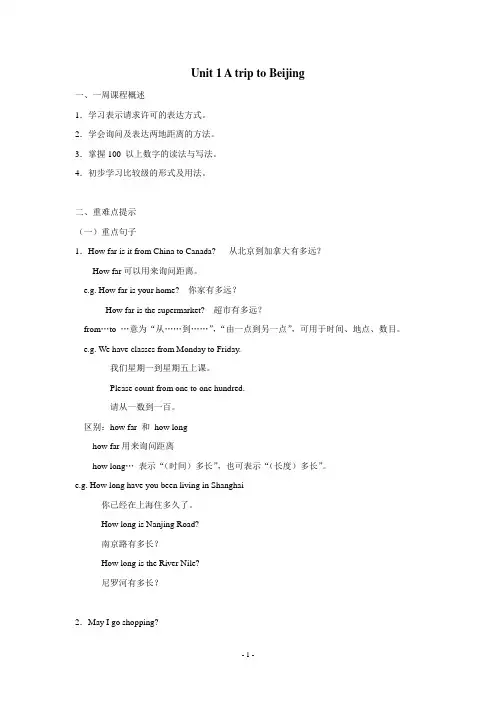
Unit 1 A trip to Beijing一、一周课程概述1.学习表示请求许可的表达方式。
2.学会询问及表达两地距离的方法。
3.掌握100 以上数字的读法与写法。
4.初步学习比较级的形式及用法。
二、重难点提示(一)重点句子1.How far is it from China to Canada?从北京到加拿大有多远?How far可以用来询问距离。
e.g. How far is your home?你家有多远?How far is the supermarket?超市有多远?from…to …意为“从……到……”,“由一点到另一点”,可用于时间、地点、数目。
e.g. We have classes from Monday to Friday.我们星期一到星期五上课。
Please count from one to one hundred.请从一数到一百。
区别:how far 和how longhow far用来询问距离how long…表示“(时间)多长”,也可表示“(长度)多长”。
e.g. How long have you been living in Shanghai你已经在上海住多久了。
How long is Nanjing Road?南京路有多长?How long is the River Nile?尼罗河有多长?2.May I go shopping?(1)may是情态动词,它的否定式为may not, 否定缩略式为mayn’t. may。
may表示允许、许可,是较郑重的词。
在表示许可时与can的用法相似。
e.g. You may go home after five o’clock.你五点后可以回家。
He may go to America next month.他可能下个月到美国去。
May I…? 用来征求别人的许可e.g. May I come in? 我可以进来吗?May I know your name? 我能知道你的名字么?May I watch TV after supper? 晚饭后我能看电视吗?(2)may有“或许”、“可能”的意思,常表示主观推测,可用于肯定句和否定句。
七年级下册英语冀教版第一单元知识点全文共6篇示例,供读者参考篇1Unit 1: A letter to a pen palHey there! It's me again, your friendly neighborhood English learner. Today, I want to share with you what I've learned from Unit 1 of our new English textbook. It's all about writing letters to pen pals, which sounds super exciting to me!The first thing we learned was the format and style of a friendly letter. It's different from the formal letters we've seen before. A friendly letter starts with the date at the top right corner, followed by a greeting like "Dear [name]" or "Hi [name]". Then comes the body of the letter, where you can write about anything you want to share with your pen pal.Next up, we talked about the content of a letter to a pen pal. Our teacher said it's important to introduce yourself and share some personal details, like your age, hometown, family, hobbies, and interests. This helps your pen pal get to know you better and find common ground.We also learned about asking questions to keep the conversation going. You can ask your pen pal about their life, interests, and opinions on different topics. This shows that you're genuinely interested in them and want to learn more.Another key point was using appropriate language and tone. Since it's a friendly letter, we should use informal language and a conversational tone, just like we're talking to a friend. No need for fancy words or overly formal expressions.Speaking of language, we learned some useful vocabulary and expressions for writing pen pal letters. Words like "interests," "hobbies," "favorite," "opinion," and "recommend" came up a lot. We also learned how to express gratitude, like "Thank you for your letter" or "I appreciate your time."Oh, and let's not forget about organizing our thoughts! A good pen pal letter should have a clear structure, with an introduction, body paragraphs, and a conclusion. This makes it easier for the reader to follow along and understand what we're trying to say.Lastly, our teacher reminded us about the importance of proofreading and editing. We should check for spelling, grammar, and punctuation errors before sending our letters.After all, we want to make a good impression on our new pen pals!Phew, that's a lot of information, but I'm excited to put it into practice and start writing to my pen pal. Who knows, maybe we'll become best friends, even though we live in different parts of the world!Anyway, that's all I've got for now. Let me know if you have any questions or need help with your pen pal letters. Until next time, happy writing!篇2Hello friends! Today I want to share with you what I've learned recently in my English class. We just started a new unit in our textbooks, and it's all about food! Yum, my favorite topic.The first thing we learned was how to talk about different foods and meals. Breakfast, lunch, and dinner are the main meals we eat every day. For breakfast, some common foods are eggs, toast, cereal, pancakes, and fruit. My favorite breakfast is waffles with strawberries and whipped cream! At lunch, people often eat sandwiches, salads, soups, or leftovers from last night's dinner. Dinner is usually the biggest meal with things like meat, vegetables, pasta, rice, and so on.We also learned to describe the taste of foods using adjectives like sweet, sour, salty, spicy, bitter, and delicious. Chocolate is super sweet, while lemons are really sour. I don't like really spicy foods, they make my mouth burn! But generally I think most foods are delicious if they are prepared well.Another useful vocabulary set was words related to preparing food and cooking. You need ingredients like flour, sugar, butter, and eggs to bake things. Utensils like pots, pans, spatulas, and whisks are used for cooking on the stove. And appliances like the oven, microwave, blender, and toaster help make cooking easier. I'm not allowed to use the oven by myself yet, but I can make simple things in the microwave.We spent some time talking about different types of cuisines too. American food has things like hamburgers, hot dogs, fries, and apple pie. Italian cuisine is famous for pizza and pasta dishes. Indian curries with spicy sauces are also really tasty. Chinese food like dumplings, fried rice, and noodles is probably my favorite! The variety of international foods is just endless.Overall, I find this unit on food really interesting and useful. Learning new vocabulary and expressions helps me describe my eating habits and favorite dishes. When I go to restaurants, I can try to figure out what dishes are from reading the descriptions.And who knows, maybe I'll be a famous chef one day and invent my own signature dishes!Cooking is also a fun activity to try at home with some help from parents. Last weekend, my mom showed me how to make chocolate chip cookies from scratch. Following a recipe carefully is important to get it right. First we mixed the dry ingredients like flour and baking soda. Then we creamed together the wet ingredients - butter, sugar, vanilla, and eggs. After combining everything and folding in the chocolate chips, we scooped rounds of dough onto baking sheets and baked them for 10 minutes. The whole house smelled amazing! My cookies turned out a little burnt on the bottom, but they were still delicious when they cooled off.I can't wait to learn more cooking skills and try making different international dishes. Maybe I'll host my own bake sale one day and get my friends to taste test everything! For now though, I've got to focus on my English studies. This food unit is packed with so much good stuff to learn. I'm feeling hungry just thinking about it all...okay, time for a snack break! Let me go grab an apple and I'll talk to you all again soon.篇3My Journey into the 7th Grade English TextbookHi there, friends! It's me, your pal Jessica, back with another exciting adventure into the world of English learning. This time, I'm diving headfirst into the 7th grade English textbook, and let me tell you, it's been quite a ride!Unit 1: Exploring the Great OutdoorsThe first unit of our textbook is all about the great outdoors and the wonders of nature. Can you believe it? We're learning about things like camping, hiking, and even survival skills! Talk about an adventurous start to the school year.One of the most interesting parts of this unit was learning about the different types of camping. Who knew there were so many ways to experience the great outdoors? From tent camping to RV camping, and even glamping (that's glamorous camping, for those of you who didn't know), we covered it all.But it's not just about pitching tents and roasting marshmallows. We also learned about the importance of respecting nature and being responsible campers. That means leaving no trace, following the "leave no trace" principles, and being mindful of our impact on the environment.Speaking of the environment, we delved into some pretty cool vocabulary related to nature and outdoor activities. Words like "wilderness," "panorama," and "pristine" became our new best friends. And let's not forget the exciting verb phrases like "pitch a tent" and "build a campfire" – because what's camping without those essential skills?But wait, there's more! We also explored the world of hiking and the different types of trails you can tackle. From easy,well-marked trails to challenging backcountry treks, we learned about the importance of proper preparation and safety measures. Who knows, maybe one day we'll be tackling the Appalachian Trail or the Pacific Crest Trail!And if you thought camping and hiking were the only things we covered, think again! We also learned about survival skills and what to do in case you ever find yourself in a sticky situation out in the wilderness. Things like building a shelter, finding water sources, and even starting a fire with just a few simple tools. Let's just hope we never have to put those skills to the test!Unit 1 Grammar GoodiesWe dove into the world of modal verbs like "can," "could," "should," and "must." These little guys help us express things likeability, permission, obligation, and advice. Who knew they could be so handy when planning an outdoor adventure?Speaking of adventures, we also learned about the present continuous tense and how to use it to describe ongoing actions. Because let's face it, when you're out in the wilderness, things are always happening – hiking, setting up camp, or even fending off a hungry bear (just kidding, we haven't covered that part yet!).And let's not forget about prepositions of place and movement. These little words help us navigate the great outdoors by describing where things are and how they move. After all, you need to know how to "hike along the trail" or "camp by the lake" if you want to be a true outdoor enthusiast.Unit 1 Wrap-UpPhew, what a journey it's been! From learning about the different types of camping and hiking to mastering survival skills and tackling grammar concepts, Unit 1 of our 7th grade English textbook has been an absolute blast.But don't worry, the adventure doesn't stop here. We've still got plenty more units to explore, each with its own set of exciting topics and language challenges. Who knows what adventures await us in the next unit?Until then, keep practicing your English skills, and don't forget to pack your virtual camping gear – we might need it for our next outdoor escapade!篇4Title: Exploring Unit 1 of the 7th Grade English TextbookHi there! My name is Emily, and I'm a 7th grader at Sunshine Middle School. I've been learning English since I was a little kid, and I have to say, it's been quite a journey! Recently, our class started studying Unit 1 of our new English textbook, and let me tell you, it's been an adventure!The first thing that caught my attention was the unit's title: "Making Friends." As a kid, making friends is such an important part of growing up, and it's fascinating to see how this theme is explored through the lens of the English language. The unit introduces us to various characters, like Lily and her friends, who are navigating the ups and downs of friendship and social interactions.One of the key language points we learned is how to express likes and dislikes. This might seem like a simple concept, but it's actually quite crucial in building relationships and communicating effectively. For example, we learned how to saythings like "I like playing basketball" or "I don't like spicy food." These phrases might seem basic, but they help us connect with others and share our interests and preferences.Another important aspect of the unit is learning how to introduce ourselves and ask questions about others. We practiced dialogues like "What's your name?" and "Where are you from?" These simple phrases open up the door to building new friendships and learning about each other's backgrounds and cultures.Speaking of cultures, the unit also touched on the importance of understanding and respecting different customs and traditions. We learned about various greetings and gestures used in different parts of the world, which was reallyeye-opening. It's amazing how something as simple as a handshake or a bow can have such different meanings across cultures.One of my favorite parts of the unit was learning about idioms and expressions related to friendship. Phrases like "a friend in need is a friend indeed" and "make new friends, but keep the old" really resonated with me. They reminded me of the value of true friendship and the importance of maintaining strong bonds with the people who matter most.One particular grammar point that stuck with me was the use of modal verbs like "can," "should," and "must." These little words pack a big punch when it comes to expressing ideas like ability, permission, and obligation. For example, "You should be a good friend and listen to others" or "Can you help me with my homework?" These modal verbs add nuance and depth to our communication.Another aspect of the unit that I found really interesting was the focus on writing skills. We learned how to write friendly letters and emails, which is a great way to maintain connections with friends and family members who live far away. We practiced using appropriate greetings, closings, and language to convey our thoughts and feelings in a letter format.Throughout the unit, we also engaged in various activities and games to reinforce the concepts we were learning. From role-playing dialogues to vocabulary games, these interactive exercises made the learning process fun and engaging. One of my favorites was the "Friendship Bingo" game, where we had to find classmates who matched different descriptions related to friendship, like "someone who likes the same sports as you" or "someone who has the same favorite book as you."As we progressed through the unit, I couldn't help but reflect on the importance of friendship in our lives. Friendships provide us with support, laughter, and shared experiences that shape who we are. Learning about friendship in the context of the English language not only helped us improve our language skills but also gave us valuable insights into building and maintaining meaningful relationships.Overall, Unit 1 of our 7th grade English textbook was a fantastic introduction to the world of friendship and interpersonal communication. From expressing likes and dislikes to understanding cultural nuances, we covered a wide range of topics that will undoubtedly be useful as we navigate the social landscape of middle school and beyond.I'm grateful for the opportunity to learn about these important concepts in a fun and interactive way. Who knows, maybe someday I'll use the skills I learned in this unit to make friends with someone from another country or culture! The possibilities are endless when you have the power of language at your fingertips.篇5Hi there! It's me again, your friendly neighborhood kid who loves to learn English. Today, I want to share with you all the cool stuff I learned from Unit 1 of my Grade 7 English textbook. Get ready for a fun ride!The first thing we covered was asking and answering questions about personal information. It's like playing a game of 20 Questions, but in English! We learned how to ask things like "What's your name?", "How old are you?", "Where are you from?", and "What's your favorite subject?". I love asking my friends these questions and finding out more about them.Next up, we learned how to introduce ourselves and others. It's like being a TV host, but instead of introducing celebrities, we're introducing our classmates and family members. We practiced saying things like "This is my friend, Alice. She's from Beijing." or "That's my dad. His name is Robert." It's super handy for when we have guests or meet new people.Then, we moved on to talking about our daily routines and habits. I'm sure you all have your own routines, like waking up, brushing your teeth, having breakfast, and going to school. Well, now we can describe all of that in English! We learned phrases like "I get up at 7 o'clock every morning" and "I always do myhomework after school." It's like giving a play-by-play of our day, but in a different language.Speaking of language, we also learned how to talk about the languages we speak or study. For example, I can now say "I'm learning English at school" or "My mom speaks Spanish fluently." It's like having a secret code with your friends who also learn languages.But wait, there's more! We also covered talking about our hobbies and interests. I love telling people that "My favorite hobby is playing basketball" or "I'm really interested in science experiments." It's a great way to find friends who share the same interests as you.And that's not all! We even learned how to describe people's appearances and personalities. So, if I wanted to describe my best friend, I could say something like "She has long, curly hair and a friendly personality." It's like painting a picture with words, but the canvas is your imagination.Last but not least, we learned how to talk about our family members and their occupations. I can now say things like "My dad is a teacher" or "My aunt is a doctor." It's like having a family tree, but instead of just names, you get to know what everyone does for a living.Phew, that was a lot of information, wasn't it? But don't worry, we'll keep practicing and reviewing until it all becomes second nature. Learning a new language is like unlocking a secret world, and I'm so excited to explore it with you.Keep shining, my fellow English learners! Remember, practice makes perfect, and before you know it, we'll be chatting away like native speakers. Until next time, take care and keep on learning!篇6Hello! My name is Emily and I'm a 7th grader. In English class this semester, we're using a new textbook and just started the first unit. It's all about sports and keeping fit. I wanted to share what I've learned so far because I think it's really interesting and important stuff!The first thing we talked about was how physical activity is crucial for maintaining good health. Our teacher explained that regular exercise helps strengthen our hearts, lungs, and muscles. It also boosts our immune systems to help us fight off illnesses. I didn't realize just how many benefits there are from being active!We learned about some of the different types of exercise too. Aerobic activities like running, swimming, and cycling get yourheart pumping and improve cardiovascular fitness. Strength training with weights or resistance bands builds muscle. Flexibility exercises like yoga and stretching prevent injuries and increase your range of motion. Our teacher said it's best to mix different kinds of activities for overall fitness.Another really important point was about following safety precautions when playing sports or exercising. You're supposed to wear protective gear like helmets, kneepads, etc. Warming up beforehand prevents pulled muscles. Staying hydrated is crucial, especially in hot weather. And you have to use proper techniques to avoid injuries. Safety first!One thing I found fascinating was learning about how different cultures have their own unique traditional sports and games. For example, we read about bocce ball which originated in Italy. And sepak takraw is like a cross between volleyball and soccer that's really popular in Southeast Asia. It's so cool to see the creative games people have invented all over the world!We also spent some time discussing nutrition and how the foods we eat impact our energy levels and overall health. Our teacher went over the different food groups and which nutrients our bodies need. Things like whole grains, fruits, veggies, lean proteins, and healthy fats should make up the bulk of our diets.But sugary, fatty, salty, and processed foods aren't good for us, at least not in large amounts.Another key point was developing positive habits and attitudes toward physical activity from a young age. Our teacher stressed how important it is to find activities we genuinely enjoy since we're more likely to stick with them. She said not to get discouraged if we're not naturally athletic - just focus on doing our best and having fun. The goal is simply to get moving regularly!My personal favorite part so far has been learning about some famous athletes and their inspiring stories. We read about people who overcame major obstacles through hard work and perseverance to become champions in their sports. It just goes to show that with enough passion and dedication, you really can make your dreams come true against all odds!Overall, this unit has been eye-opening. I had no clue just how critical exercise, nutrition, and an active lifestyle are for kids my age. Our teacher has really emphasized that developing these healthy habits now will pay off big time down the road. I'm feeling motivated to get out there and try some new physical activities myself. Maybe I'll take up swimming or kickboxing -who knows? All I know is, this stuff is way too important to ignore. Gotta get moving!。
Unit 1 ReviewI 单项选择I go to Tian’anmen Square ----_________A. Yes, you can’t.B. No, you mayC. Yes, you mayD. No, I may not2. ---- ____ is it from your school to your home---- It’s about 300 metres . It’s nearA. How longB. How farC. How oftenD. How3. There are ______ books in the library.A. two thousand ofB. two thousandsC. thousands ofD. thousand of4. He _______ home late.A. arrives atB. arrives inC. get toD. reachto read “10765” __________A. Ten thousand seven hundred and sixty-fiveB. Ten seven sixfiveC. Ten thousand seven hundred sixty fiveD. One thousand seven hundred sixty-five6. Can you ________ the bird in the treeA. lookB. watchC. seeD. seeingdoes your new English teacher look like---- She is a pretty lady ________ long hair.A. forB. onC. withD. at8. Linda, _______ the camera with you.A. takeB. takesC. will takeD. took 9. ----Look at that photo What a happy family----Yes, it’s a photo ______ my family.A. atB. forC. ofD. in10. Yao Ming is famous_______ a basketball player.A. toB. asC. forD. between11. Mr. Smith jumps _______ the horse.A. intoB. atC. ontoD. in12. The boy fell_____ his bike yesterday morning.A. inB. offC. behindD. overroad is about _________ long.A. three hundred kilometreB. three hundred kilometresC. three hundreds kilometreD. three hundreds kilometers14. It’s far away from Shanghai. We have to fly______ Shanghai.A. byB. /C. toD. on15. ----What are you doing----I’m _____ my key. But I can’t ____ it anywhere.A.finding; look forB. looking for; findC. finding;find D. looking for; look for16. Wang Baoqiang is so popular here. Look! There is ______ news about him.A. so manyB. so muchC. a fewD. a little17. ----Will you go there by ________ train---- No, I’ll take _____taxi.A. /;aB. a; theC. /; /D. the; a18. The train goes ______ Beijing ____ Shanghai.A. from; andB. to; toC. from; toD. in; and’s go shopping tomorrow! ----________.A. All rightB. RightC. That’s all rightD. You’re right20. I want to sit on one of the ________!A. houseB. horseC. horsesD. housesII 完形填空Riding a bicycle is 1 cheap(便宜的) way to travel. The first bike was made about 150 years ago. At first, bikes were expensive. Only rich people could buy ___2__. The __3__ bikes looked different from the ones we have today. Later, __4___ bicycles were cheaper, __5__ people could buy them and began to ride bikes to work and in __6__ free time.Today, people use cars more than bikes. Cars are much ___7__ and we don’t get __8___ when it rains! But some people __9__ like to cycle to work. They say that __10__ are too many cars in the town centers and they can’t find anywhere to park( 停车).21. A. the B. an C. a22. A. they B. its C. them23. A. same B. late C. early24. A. when B. if C. that25. A. much B. many C. a little26. A. their B. his C. its27. A. fast B. faster C. fastest28. A. cold B. wet C. warm29. A. still B. also C. often 30. A. they B. there C. here III. 阅读 ABSunday : We shop in Wangfujing Street .Monday : We leave Beijing for Baoding.Tuesday : We go to Baiyangdian.Wednesday : We go to the zoo.Thursday : We go shopping.Friday : We leave Baoding and go to Shijiazhang.根据上面的内容回答问题。
1. How many days will they stay in Baoding_____________________________________________________________2. What will they do on Tuesday________________________________________________________3. Will they go shopping in Baoding_________________________________________________________4. When will they go to Shijiazhuang_________________________________________________________CA Two-day Trip to BeijingIf you want to know about China, please come to Beijing. You can visit the Great Wall and other places of interest and enjoy Beijing Duck.Time: May 6~7 Price: 480 yuan per person Tel: 7845-6895A Four-day Trip to QinhuangdaoIf you like warm weather and clean cities, Qinhuangdao is a good place for you. You can mountains, enjoy beautiful beaches and go to the zoo.Time: May 1~4 Tel: 5647-8445 E-mail : 126yc@sina. comAdult(成人): 780 yuan per person Child: 550 yuan per personA Seven-day Trip to SanyaThere are many beautiful places in Sanya. You can walk along the beaches, go fishing and go boating.Time: May 10~17 Call us at 800-820-8199Price: 1 person : 650 yuan per person2-5 persons: 600 yuan per person6-9 persons: 550 yuan per person1. If you want to go on a two days’ trip on Saturday an Sunday , you can choose(选择) a trip to ___________.A. BeijingB. QinhuangdaoC. SanyaD. Taiyuan2. If you go to Qinhuangdao, you can __________A. visit the Summer PalaceB. go to the zooC. enjoy Beijing DuckD. go to the park3. Sam wants to visit Sanya, he can call ___________ .A. 7845-6895B. 5647-8445C. 800-820-8199D. 800-820-80994. If Mr. black with his two children take a seven-day trip to Sanya, it will cost ____A. 1950 yuanB. 1800 yuanC. 1650 yuanD. 1790 yuan5. Tom can _______ on his trip from May 1 to May 4.A. eat Beijing DuckB. climb mountainsC. visit the Great WallD. go boatingDMr. White lives in a very old town near London. There are a lotof trees and flowers around his house. On Sundays hundreds of people from London visit the town and they all like Mr. White’s trees and flowers. Mr. white mends(修理) bikes, cars and machines (机器) for other people. After work in the afternoon, he waters the trees and flowers. Then he goes into his house and drinks tea with . But now Mr. White isn’t watering the trees. It’s raining. He is talkingwith some friends. He likes living in this old town.根据短文内容回答下列问题。